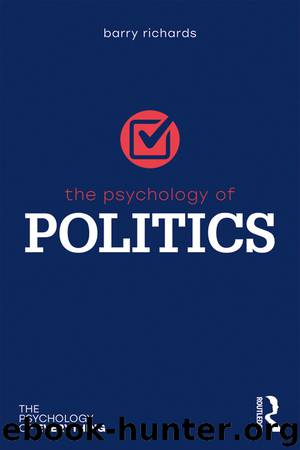The Psychology of Politics by Richards Barry;

Author:Richards, Barry;
Language: eng
Format: epub
Publisher: Taylor & Francis (CAM)
Published: 2019-03-04T16:00:00+00:00
The distribution of dignity for all
As a bridge into fully psychological territory, we must refer to the work of another leading theorist of the nation and nationalism. Liah Greenfeld2 offers a very different historical account from that of Smith, on the face of it a very modernist one (albeit early modernist). She argues that the idea of the nation was born in the aftermath of the Wars of the Roses in fifteenth-century England. Those protracted and bloody wars, between two royal ‘houses’ contending for the throne of England, had decimated the ruling aristocracy. So when Henry VII emerged as the victorious king and established the Tudor dynasty, it was necessary to repopulate the ruling elite (on whom the monarch depended to carry out many practical and political functions) through the upward mobility of leading members of the non-aristocratic strata. This required a radical change in how people understood their social world. The existing order was one of fixed ‘estates’, God-given social ranks which people were born into and could not fundamentally transcend. Large-scale social mobility was simply not possible within that theologically grounded worldview. To achieve and consolidate the inconceivable change required, the idea of the nation as a community within which all were equal subjects of the monarch was born. This meant that social mobility could be understood as entirely possible, and that a new basic self-respect could be felt by all deemed to be subjects.
This account is of particular interest to us here because although it fits the modernist template in seeing national feeling as an artefact which emerged to serve a socio-political purpose, it has a persuasive explanation for the depth of the nation’s psychological appeal. It identifies a psychological need that is met, and benefit that is brought, by the definition of oneself as a subject or citizen who is in a fundamental respect the equal of all others in the nation. This is summed up in the concept of dignity, which we have identified as a key theme in the psychology of politics. The concept of the nation which, according to Greenfeld, crystallised in sixteenth-century England, had at its centre the principle of an irreducible individual dignity for all, irrespective of whatever inequalities, oppressions and privations may have dominated the lives of many. And, argues Greenfeld, it is this deeply attractive feature of national identity which has driven the spread of nationalism around the world, although the conditions and consequences of its uptake differ widely according to context.
Overall, Greenfeld sees national identity and its democratisation of dignity as the basis for the subsequent global development of democratic institutions. She goes on to see it also as the basis for the spread of capitalism, and for the individualism (both its freedoms and its costs) of the modern and post-modern world. But whether or not we might agree with her broader conclusions, or indeed with her specific theory of the Tudor origins of national identity, we can suggest on the basis of her work that an important
Download
This site does not store any files on its server. We only index and link to content provided by other sites. Please contact the content providers to delete copyright contents if any and email us, we'll remove relevant links or contents immediately.
Rewire Your Anxious Brain by Catherine M. Pittman(18230)
Talking to Strangers by Malcolm Gladwell(12828)
The Art of Thinking Clearly by Rolf Dobelli(9853)
Mindhunter: Inside the FBI's Elite Serial Crime Unit by John E. Douglas & Mark Olshaker(8669)
Becoming Supernatural by Dr. Joe Dispenza(7810)
Change Your Questions, Change Your Life by Marilee Adams(7344)
The Road Less Traveled by M. Scott Peck(7256)
Nudge - Improving Decisions about Health, Wealth, and Happiness by Thaler Sunstein(7216)
The Lost Art of Listening by Michael P. Nichols(7139)
Mastermind: How to Think Like Sherlock Holmes by Maria Konnikova(6912)
Enlightenment Now: The Case for Reason, Science, Humanism, and Progress by Steven Pinker(6856)
Win Bigly by Scott Adams(6802)
The Way of Zen by Alan W. Watts(6271)
Daring Greatly by Brene Brown(6210)
Big Magic: Creative Living Beyond Fear by Elizabeth Gilbert(5325)
Grit by Angela Duckworth(5278)
Men In Love by Nancy Friday(4947)
Ego Is the Enemy by Ryan Holiday(4922)
Altered Sensations by David Pantalony(4847)
